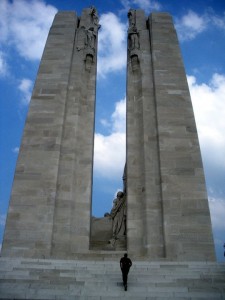
The Canadian National Vimy Memorial. It is dedicated to the memory of dead and missing Canadian soldiers in the First World War.
War does not end with armistices or the signing of instruments of surrender. For those who live through it, are affected by it or left bereaved by it, war remains a permanent feature in their lives. This is why I think memory and war is such a fascinating and important subject.
I am particularly interested in two different perspectives from which war has been remembered. The first is from a collective or national perspective. This can be explored through a variety of media. War memorials, for example, tell us much about how different generations have, retrospectively, made sense of war. I am also interested in how other forms of popular culture, such as films and literature, have created shared narratives of the two World Wars.
The second perspective in which I am most interested is individual memory, and how private memories have intersected with public ones. One of the key questions I have explored in my research is how shared narratives can both help and hinder individuals in gaining recognition and understanding for what they have been through.
Please see my speaking engagements and my published work for how I have studied memory and war
